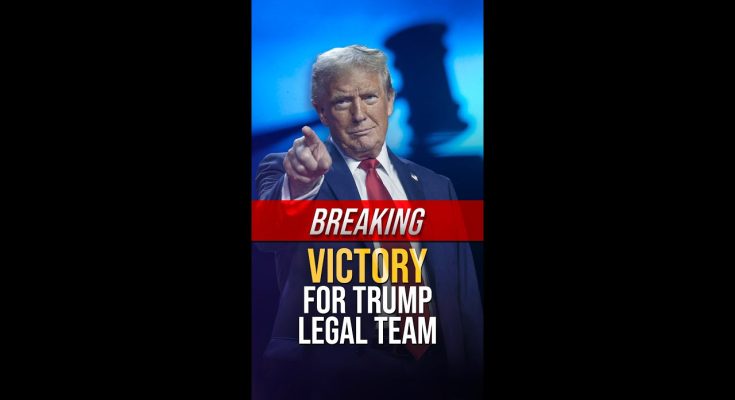Former President Donald Trump recently achieved a legal victory in New York as his legal team successfully persuaded Judge Juan Merchan to grant a pause in proceedings related to his conviction on 34 felony counts of falsifying business records. This case originates from payments made in connection with adult film star Stormy Daniels, where prosecutors alleged that Trump’s records of these payments violated state laws. Judge Merchan’s decision to delay sentencing, initially set for November 26, will allow Trump’s team to explore claims of presidential immunity and other legal avenues, making this a significant turning point in Trump’s ongoing legal battles.
### Background of the Case
Trump’s New York legal case has been ongoing for several years and involves claims that he falsified business records to conceal payments made to Stormy Daniels during the 2016 presidential campaign. Trump has faced similar legal challenges in various states, but this case is notable as one of the first where a former president was convicted of crimes directly related to business records and campaign finance. The legal basis for these charges comes from New York state laws, which have strong regulations around business documentation, making this a unique case with specific state implications.
Earlier this year, Trump’s legal team requested a delay in the sentencing process, and Judge Merchan granted an initial delay. Now, with the current postponement, the legal team has an opportunity to further examine immunity claims that may affect the case’s outcome. Trump’s team has argued that actions taken during his presidency should provide him with some immunity under the Supreme Court’s recent interpretations. These developments have led to considerable debate over whether presidential immunity should apply to state-level cases and if Trump’s actions fall under the scope of his official duties.
### Presidential Immunity and the Supreme Court’s Role
The question of presidential immunity has long been a complex issue in U.S. law. Typically, the Department of Justice holds that a sitting president cannot be prosecuted for crimes at the federal level, maintaining a stance that the executive branch must remain above certain legal proceedings during their term. However, this has not been tested at the state level, and Trump’s case raises an unprecedented question: Can a former president be shielded from state criminal convictions?
In a recent ruling, the Supreme Court provided broader guidelines on the scope of presidential immunity, stating that presidents are entitled to a presumption of immunity for actions taken within their official duties. Trump’s legal team believes that this immunity should extend to his actions regarding his business practices and campaign activities, potentially affecting the validity of the state-level convictions.
If Judge Merchan ultimately rules in favor of applying the Supreme Court’s immunity interpretation, it could significantly alter the landscape of legal actions against former presidents. However, the judge’s current decision only grants a pause for further consideration of these arguments rather than a final ruling. This gives Trump’s legal team time to prepare a stronger case to challenge the charges, perhaps all the way to the Supreme Court if necessary.
### Legal Implications and Possible Outcomes
The potential for presidential immunity to apply at the state level remains an untested area of constitutional law. Trump’s team has hinted that they may appeal all the way to the Supreme Court if Judge Merchan does not dismiss the charges. By delaying sentencing, Judge Merchan has provided Trump’s attorneys an opportunity to refine their arguments on immunity and to potentially escalate the case to higher courts if their arguments are dismissed.
If the New York state courts ultimately uphold Trump’s conviction, his legal team may then seek federal review of the case on constitutional grounds. Alternatively, they could request the case be moved to federal court, arguing that the charges involve federal campaign issues beyond the scope of state law. Such an elevation could invoke federal laws that may provide Trump additional protections or procedural advantages.
One possible outcome could involve a partial dismissal of charges based on immunity grounds, a decision that would mark a substantial precedent for future cases involving presidents. Another potential outcome is that Trump’s team successfully argues that the state does not have jurisdiction over alleged campaign finance violations or other actions taken while Trump was a federal official, which could lead to a dismissal of the case altogether.
### Public and Political Reactions
Trump’s legal victories, even if only temporary, have had substantial implications beyond the courtroom. Supporters argue that the New York case is politically motivated, designed to target Trump as he campaigns for a return to the presidency in the 2024 election. His legal team has also framed the case as an example of the “weaponization” of the justice system against political figures, a theme that has been echoed by several Republican politicians and commentators.
On the other hand, Trump’s critics view this legal victory as a setback for accountability. They argue that delaying the sentencing and potentially dismissing charges due to presidential immunity would establish a dangerous precedent, allowing presidents and former presidents to act with impunity. Legal scholars and political analysts have voiced concerns that expanding presidential immunity might erode the rule of law, especially if it can be applied retroactively to actions that a former president took as a private citizen.
This division reflects broader public sentiment around Trump’s legal battles. His base of supporters sees the delays and immunity claims as justified, given the extraordinary nature of his political influence and the unique position of former presidents. Conversely, opponents believe that the delays indicate a double standard in the legal system, where high-profile figures receive more lenient treatment.
### Broader Implications for Future Presidents
The outcome of Trump’s case may set a lasting precedent for future presidents and presidential candidates. If Trump’s immunity claim is successful, it could establish a broader shield for presidents, impacting how future cases against presidents are prosecuted and under which jurisdiction. A ruling in Trump’s favor could provide protections for presidents from state-level prosecutions, a result that could embolden future presidents to act without fear of state law consequences.
Moreover, this case has raised questions about the balance between federal and state authority, especially in instances where state laws intersect with federal campaign and business regulations. The concept of federal supremacy could play a crucial role if Trump’s legal team seeks to transfer the case to federal court, challenging the state’s ability to prosecute cases with a federal component.
### Conclusion
Trump’s recent legal victory in New York underscores the unique and complex legal terrain former presidents may navigate after leaving office. The delay granted by Judge Merchan allows Trump’s legal team to thoroughly investigate immunity claims and appeal strategies that could dismiss or reduce his convictions. This case, highlighting the intersection of state laws, federal immunity, and the unique status of a former president, could reshape how the U.S. judicial system handles cases involving high-level political figures. As Trump’s legal battle continues, the implications extend far beyond his own legal jeopardy, potentially influencing constitutional interpretations, state-federal legal dynamics, and the conduct of future presidents.



